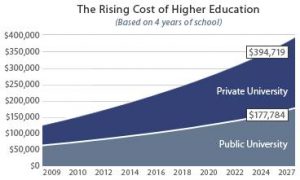Is the Price of College Too Much?
Seniors Jill Trudell and Kelley Darah represent Michigan State University
As students continue to receive their responses from colleges, they also begin to anticipate scholarships and financial aid opportunities.
Some students plan to take what is commonly called a “gap year,” and others have plans to join the military or attend vocational schools. But whatever their plans, most students – and their parents – fill out their Free Application for Federal Student Aid- yes, the dreaded FAFSA – and most worry about the amount of money they will actually have to pay for college.
“The problem with higher education is that people think of it as a necessity but price it as a luxury,” said senior Lydia Kudet. “Every year, people have to give up their dreams that they have been working towards their entire life because of the cost of college.”
According to the College Board website, state residents paid an average of $18,943 on tuition, room, and board in 2013 at public schools. Even at a two-year, community college, students paid $11,052 per year.

As the pressure to decide which college to attend increases, students consider their options. Many students resign themselves to the fact that they will be in debt for a majority of their adult lives if they go to college, and they ask themselves, “Is the price of college too much?”
According to Project on Student Debt, 69 percent of college students graduated with student loan debt in 2013, with an average of $28,400 per person. It takes an average of 10 years to pay back student federal loans, according to the Consumer Financial Protection Bureau.
Some countries charge their citizens less than half of what the United States charges for college. In Germany, public institutions charge around €60 ($73.65) per semester, as compared to the average US in-state public college price of $6,000 per semester. College costs in the US continue to rise to outrageous numbers, pricing even middle class families out of the possibility of a college education for their children.
To combat outrageous college prices, high school students are trying to take as many Advanced Placement tests as possible to earn college credit and are dual enrolling at local colleges. Parents and advisors also suggest getting a job while attending college. One thing that everyone agrees upon is careful planning in order to graduate on time and avoid paying for an extra year of college.
In a speech given in Buffalo, New York in 2013, President Barack Obama said, “Now, if we move forward on these three fronts – increasing value, encouraging innovation, helping people responsibly manage their debt – I guarantee you we will help more students afford college. We’ll help more students graduate from college. We’ll help more students get rid of that debt so they can a good start in their careers.”
President Obama has proposed to increase the value of higher education, encourage a more innovative way to pay for college, and to help students manage their debt. Although he proposed action on these three fronts, the price of college continues to inflate.
Because of the ever-increasing college costs, some students take advantage of the “gap year” concept so that they can work in order to save some money for college. Others use that “gap year” for other reasons.
“I feel a gap year is about finding yourself as a person,” said senior Ryan Gibbons. “No matter what you do during the course of a gap year, it gives you a different experience that high school and college don’t provide. It can change your perspective and prepare you for more real world problems.”
Deciding the rest of your life is usually harder to do than deciding which college to attend. Some students plan on taking a gap year to discover their passion.
“I don’t want my parents to waste any money considering I don’t know what I want to do, so I just figured I would take a year off to think about it,” said senior Jared Nelson. “I’m going to travel with a couple of friends from church and figure it out with them.”
No one disputes that college affordability and accessibility are increasingly becoming an issue for students and their families, but how should America combat this problem? Should all students take a gap year between high school and college to earn money and experience? Although the answer is unclear, it is imperative that colleges reduce their prices.
For more information about President Obama’s speech, read: http://www.whitehouse.gov/the-press-office/2013/08/22/remarks-president-college-affordability-buffalo-ny





